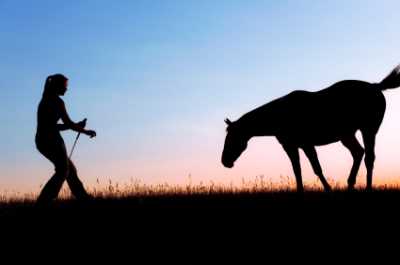|
By Jerry Tardif
Fortunately for us humans, horses are very adaptable in many areas, but especially regarding the building of trust.
That's because they're always testing each other and those humans with which they interact to find the horses and people that THEY CAN TRUST and to weed out those they cannot.
The horses through the millennia that didn't do that followed incompetent leaders to their deaths.
For humans, trust means we can believe what we're told by others.
But for horses, it's more than that.
They want to know that you won't hurt them, and equally important, that you'll protect them when there's danger around.
Horses choose to follow the alpha that will lead them away from danger and not into it.
They want a strong leader they can follow.

|
|
A Horse Getting a Lesson
|
Many humans get into problems controlling horses because they treat them like a cat or a dog — horses view relationships in a completely different way.
And you hear many horse people and trainers warn against all kinds of things from telling you not to offer treats to telling you not to hug your horse.
My experience has been different.
I do hug my horse and he enjoys it and having me nearby while he grazes.
I also offer treats from time to time that he obviously also enjoys.
But what I do with him and every other horse with which I come into contact is to not allow them to push me around nor to make decisions for both of us when I'm nearby or mounted.
When I'm with a horse, he needs to pay attention to me.
When on the ground and I'm grooming, he can't just leave for better grazing or for any other reason — I won't let him.
The horse will still test me, perhaps brush me with his head — that results in a "HEY!" and a quick, hard, push from me or a snap of the lead line.
He can approach me in my space gently, but that's all.
I will not allow any horse to push me or bump me, even by accident.
This approach makes the horse be very alert of being careful when near me.
If he's spooked, he has to jump AWAY FROM ME.
Of course, it's incumbent upon me to also be alert in case a spook doesn't work out as I've trained and the horse still jumps my way.
But astonishingly, horses trained this way generally jump away — they're very aware and my experience has shown me that horses definitely know the difference.
If I'm mounted, a horse needs to follow my commands and not make decisions on his own.
I'll determine when to start, stop, turn, and change gaits — not him.
On the trail, a horse may try for a juicy clump of grass or a klatch of birch leaves, but I'll stop him with a subtle twitch on the reins.
That usually does it and I've found that the trick is to pay attention and twitch the reins early when the horse is just starting to go for the munchies he has his eye on.
If you wait until it's nearby, a stronger signal is generally needed.
If the horse persists and fights for the grass or leaves, he'll get a stern "No!" and a much harder tug of the reins.
More persistence will result in a snap of the reins.
Still more results in some time in the round pen with me directing and him moving at whatever gait and for however long I determine.
Most of the time, the horse will obey and give me an expression indicating "Oh! Just checking if you're still serious."
When more intense checking of my seriousness occurs, so does the response.
If you watch horses interacting together and with their alpha, this happens all the time — it's their nature.
The reason they keep testing is to assure the alpha or you are still worthy and that they're following ONLY the most competent and strong leader.
As the Horse Girl and I have written many times, when we're interacting with horses, the leader MUST BE US, for our own safety's sake.
Horses are just too big and powerful for us to let them take control and push us around should they not respect us.
If you're in charge and consistent without being abusive, your horse will not only trust you, he'll also want to spend time with you because he'll feel safe and your actions will be predictable — that's what's important for a horse to be happy and feel comfortable.
Besides being an avid trail rider, Jerry Tardif is a technology consultant and a horse and nature photographer in SE Connecticut — see his work at: www.jerrytardif.com.
He is also co-founder and President of QueryHorse.
Back to Article Index
|